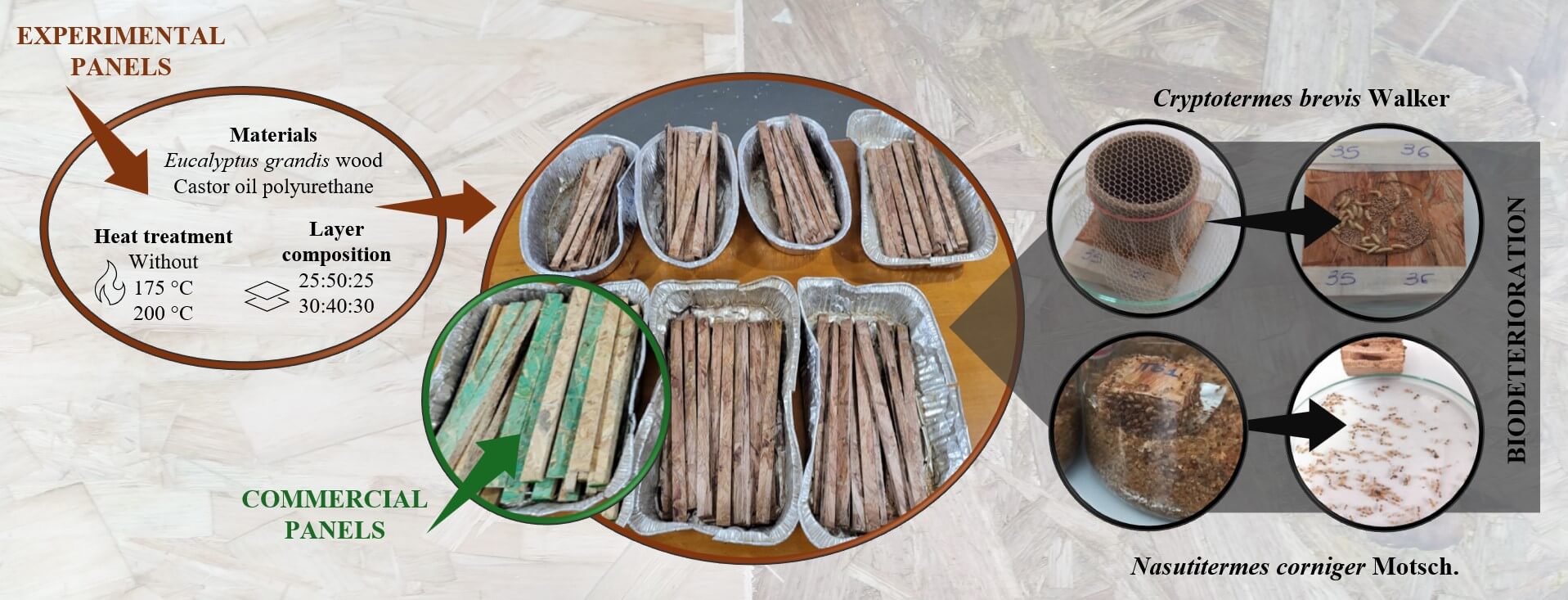 Open Access
Open Access
ARTICLE
Termite Resistance of Heat-Treated Eucalyptus OSB Bonded with Eco-Friendly Castor Oil Adhesive
1 SerQ, Innovation and Competence Forest Center, Sertã, 6100-711, Portugal
2 Materials and Technology Department, Faculty of Engineering and Sciences of Guaratinguetá, São Paulo State University (UNESP), Guaratinguetá, 12516-410, Brazil
3 Department of Civil Engineering, University of Coimbra, Coimbra, 3030-790, Portugal
4 Exact Sciences and Technology Center, Federal University of São Carlos, São Carlos, 13565-905, Brazil
5 Department of Forest and Wood Science, Federal University of Espírito Santo, Jerônimo Monteiro, 29550-000, Brazil
* Corresponding Author: Estefani S. Sugahara. Email:
(This article belongs to the Special Issue: Advances in Eco-friendly Wood-Based Composites: Design, Manufacturing, Properties and Applications – Ⅱ)
Journal of Renewable Materials 2024, 12(11), 1911-1925. https://doi.org/10.32604/jrm.2024.056198
Received 16 July 2024; Accepted 23 September 2024; Issue published 22 November 2024
Abstract
Over the last decade, the oriented strand board (OSB) market presented meaningful growth. However, as a wood-based product, because of its anatomical structure and chemical composition, OSB can be damaged by biodeterioration agents. Given that, the biodeterioration of OSB panels must be investigated to improve its durability. In this way, this work analyses the biological resistance against termites (Cryptotermes brevis and Nasutitermes corniger) of heat-treated OSB panels made with Eucalyptus wood glued with vegetable-based polyurethane-an eco-friendly and sustainable adhesive derived from castor oil. Various panels were produced with different layers compositions (face:core:face of 25:50:25 and 30:40:30) in wood mass proportion and were submitted to postproduction heat treatment (at 175°C and 200°C) replacing the use of chemical insecticides. The influence of the layers variation and heat treatment temperature were evaluated, and these results were compared with commercial panels (made from pinus wood with insecticide). The results showed that the heat treatment did not improve the resistance against termite attack. However, all the experimental panels presented a satisfactory performance that was compatible with the commercial panels produced with insecticide available in the Brazilian market. The combination of Eucalyptus wood and castor oil adhesive to produce OSB, in any variation of layer composition, demonstrated natural resistance against termite attack compatible with the commercial panels, even without using chemical additives to increase durability.Graphic Abstract

Keywords
Cite This Article
 Copyright © 2024 The Author(s). Published by Tech Science Press.
Copyright © 2024 The Author(s). Published by Tech Science Press.This work is licensed under a Creative Commons Attribution 4.0 International License , which permits unrestricted use, distribution, and reproduction in any medium, provided the original work is properly cited.


 Submit a Paper
Submit a Paper Propose a Special lssue
Propose a Special lssue View Full Text
View Full Text Download PDF
Download PDF Downloads
Downloads
 Citation Tools
Citation Tools